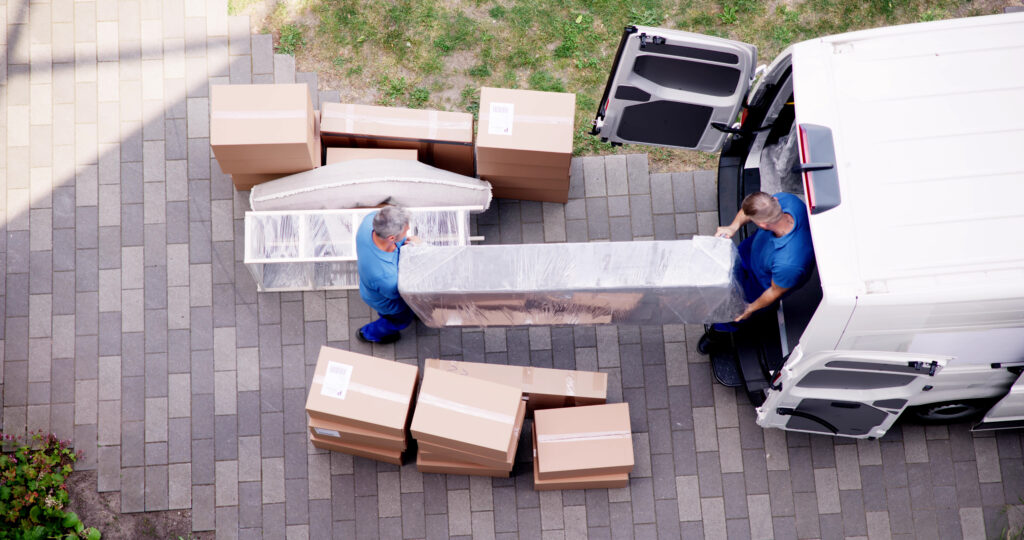Moving home is one of the most exciting milestones you’ll meet as a grown-up. Yes, moving day might be hectic and trying to organise who needs to be where and when can scramble your head at times, but with plenty of planning and preparation moving house should be a memorable experience and one you look forward to.
This is especially so when moving into a new build home – just imagine, your first night in your new home will be the first night anyone has slept in your gorgeous new house. Think of this as  a new beginning, a chance to start fresh and create something that is totally your own. Unlike moving into an older house, you won’t have to worry about renovations, repairs or maintenance, previous owners or waiting for someone to vacate on completion day. Moving into a brand new home is much less stressful than moving to an existing house.
a new beginning, a chance to start fresh and create something that is totally your own. Unlike moving into an older house, you won’t have to worry about renovations, repairs or maintenance, previous owners or waiting for someone to vacate on completion day. Moving into a brand new home is much less stressful than moving to an existing house.
You can read more about new build homes versus older properties in our related article. Or check out our blog about how to recognise the signs that it could be time to move.
We’ve put together this handy guide to take you through all the things you need to know and do before, during and after your home move, helping to keep you on track throughout this important transition. Figuring out how to relocate a house can be daunting but by breaking the steps down into smaller, more manageable tasks, you’ll be ready to tackle this next hurdle with ease.
Before Moving Home
If you’ve started thinking about moving home, then you will already have completed the initial steps of your house purchase, such as finding your perfect new home (whether a Genesis home or not!), paying a reservation fee, instructing a conveyancer, arranging a mortgage if required and meeting your developer.
By this stage you will have been given an estimated date for exchange and completion, usually within 6-8 weeks of reserving your new home. Once you have an idea of the dates you are working towards, you can begin to think about how to move house. Below you’ll find a moving house checklist with all the steps you can work towards before your new home move.
- Removals
- Storage
- Insurance
- Utilities
- Moving with pets
- Organising your possessions
- Packing
- Moving day preparation
- Support team
Removals
There are plenty of moving companies that will give you help to move house. The best way to sift through these to make a shortlist is asking local friends and family for recommendations then get quotes from three different companies. Make sure they are available for your expected date, ask about any costs for delays or changing the date, what their home moving services include, and what you might have to pay extra for, and what their payment terms are. Once you’ve amassed all this information, you will have a good idea of who is a good fit and can pencil them in for your expected date for completion.
Removals companies will offer a range of services from a basic collection and drop off, where you pack and unpack yourselves, to a full home relocation where they dismantle, package and transport your belongings and reassemble them at the other end. Obviously, a total relocation package will cost more than just support moving furniture and boxes so make sure you factor this into your budget.
You also have the option of not using a removals company and moving home yourself. To do this, you will need to sort transportation, whether hired or borrowed, and plenty of boxes, packing materials, tape and bags. If you are moving yourself, try to do as much as possible in advance and ask friends and family to help you out on the day. Timings can be quite tight for having to vacate your old home, so having extra bodies to move furniture, carry boxes, unload boxes at your new home and clean your old one will be invaluable.

Storage
If you need to move out of your existing home before your new home is ready, you may need to sort some sort of storage facility. This might happen if you’re renting or your house sale happens sooner than your purchase. Some moving companies will have associated storage facilities so ask your movers for recommendations first. Make sure that you choose a unit that will accommodate the amount of belongings you need to store and a time frame that fits with your expected completion date.
Insurance
It will be a condition of sale that you will need to organise building and contents insurance for your new home. This will likely be required by both your property developer and your mortgage provider, if you have one. It will cover your new build house from the day you take possession to ensure you have adequate protection in case of accidents, emergencies or issues. Again, be sure to shop around for quotes to get the best price and level of cover. You might find it easier to change address with your existing provider if they offer a competitive price, then switch at a later date.
Utilities
Most utilities providers will require some notice for your change of address, especially those that are associated with your household. Start by making a list of your energy, gas, water, broadband, phone and council tax providers. You should be able to change your address for many of these online, but some may require further information. You can notify all your utility providers in advance as some may not be able to continue serving you at your new address and might require notice for termination of their services. Start this process around 4-6 weeks prior to lower your chances of having to pay administrative or late notice charges for cancellation.
Moving with pets
Moving days are hectic enough without having your dog under your feet or scaring your cat into hiding. Consider moving pets to friends, family or a pet care provider a day or two before moving house to spare them the stress of strange people in your home or the sight of all your worldly possessions being boxed up. Familiar kennels and catteries will help moving house for your pet’s wellbeing and give you one less thing to think about on the day. Book well in advance to tick this off your checklist when moving home.
Organising your possessions
As you get closer to your moving day, you will want to start sorting through your possessions and deciding what to take, what to leave, what to sell or what to give away. Start with the things you don’t want to keep so you have less to pack on your moving to-do list. Give these to friends, sell them or donate to charity if they are in good condition or throw away any unwanted items on their last legs.
When thinking about what to do when moving home, start with places like the shed, loft spaces or storage cupboards and begin packing these into clearly labelled boxes with their destination in the new house also listed. Items like pictures, books, furnishings, textiles, plants and clothing can all be sorted in advance so you can concentrate your packing efforts on your belongings that you use more often.
Packing
Once you have packed the items that don’t get regular use, look at your furnishings, plants, décor, kitchen cupboards and clothing next. It is likely that you’ll be able to pack many of these weeks in advance, saving you time closer to your moving day.
Working from room to room will help you move home quicker by packing belongings into boxes that correspond to the new rooms in your new house. For example, all your kitchen equipment, cutlery and crockery will be packed in your existing kitchen and moved directly into your new kitchen. Remember to clearly label what’s in each box and what room it is headed for to enable easy allocation on moving day and to avoid having to search through multiple boxes to find things.
As you pack your way through your house, leave the items that get used the most to the very last few days before you move. This will include plates and cutlery, the kettle, kid’s toys, clothing and toiletries. Pack these items last and keep them handy during the move as they will likely be the first items you unpack at your new home.
Pack the clothes and toiletries you’re going to need over the coming days in suitcases as if you’re going on holiday. You can unpack these into bedrooms and bathrooms easily once you’re all moved in.
Think about creating a go-bag – a bag or box that contains everything you need for your first 24-48 hours in your new home. These will be personal to you and may include tea and coffee, breakfast cereals, phone chargers, favourite teddies and supplies for children or babies.
Organising your packing into boxes depending on how frequently items are used will mean you can start packing early and get a head start on cleaning down and emptying your home.
Moving day preparation
Once your completion date is confirmed, you can start planning moving day logistics. Think about what you might want to eat at your old house for breakfast, packed lunches for on the move, water bottles to stay hydrated while on the go and your first meal in your new home. You might want to avoid food shopping close to moving so there is less to pack on completion day. You might also want to pick a takeaway for your first night in your new home to celebrate after a long day. Alternatively, batch cook your meals and freeze them in the lead up to moving so you have plenty of meal options those first few nights in your new home.
If you have children, think about whether they will help you move house or whether spending the day with family might be easier. You might find they’re at school on moving day which will give you a window to empty your old home without little ones interrupting. Older kids can be roped into helping shift boxes or vacuum empty rooms.
Ask your conveyancer in advance what their process is for completion day and their expected timings. This will help plan your day so you know where and when to drop your old house keys, when the movers can access the new house and what paperwork needs signing on receipt of your brand new home.
Support team
Your support team are the friends and family available to help you move. If you have opted for a full removals package, then you may not need backup. If you are moving yourself, you will want to ask for volunteers to help. It is a mammoth task to empty a house, stick it in a van, transport it somewhere else and then unpack it again and you’ll be glad of the support.
What Happens On Completion Day
Your BIG DAY is here! It is finally time to move home.
time to move home.
Our new home moving checklist above contains all the things you need to do in the lead up to completion day. Completion on your house purchase is finalised when your property developer receives the funds for your home from your conveyancer, who will have instructed your bank or mortgage provider to release the funds following exchange of contracts. You will be notifie
d when your purchase is complete, and you will meet a representative from your developer to receive your new house keys and complete a home handover.
If you are selling a home as well as purchasing a new one, you may be reliant on receiving funds from your own purchaser to pay for your new home. This process may take a few hours on the morning of completion, especially if your completion day is a Friday which is a popular moving day where banks and solicitors have multiple transactions to finalise. You will have to wait to receive confirmation for both your house sale and purchase before vacating your old home.
Whilst you wait for completion to take place, you can finalise any last-minute packing, empty the fridge, clean areas of your house you have been using and making sure all keys, household paperwork and instructions are left out for your purchasers.
Below we’ve popped a completion day checklist for moving out to help you remember all those bits and pieces you need to do before saying goodbye to your old home.
- Confirm timings with removal company
- Final sweep of house, garden, shed and loft
- Final cleaning
- Take final meter readings
- Assemble warranties, keys, appliance instructions, thermostats etc for new owners
- Upon completion, vacate your old home
After Moving Day
After the bustle of moving day, your first night in your new home is the culmination of all your hard work over the last few weeks. Whether you sleep for England after your exertions or lie awake thinking about things you might have forgotten (we’re sure you won’t have forgotten anything if you read this blog to the end!) and what happens next, the hardest part is over.
Your next few days and weeks will be spent learning about your new home, unpacking your belongings into their new rooms, exploring the local area and meeting your new neighbours. You’ll also likely receive a 7-day courtesy visit from your customer care representative when buying a new home, who will want to check you’re settling in okay and answer any questions.
The last couple of jobs you need to think about when relocating a home are listed below. These will typically be done once you are settled in your new house.
- Mail redirection – you can arrange this with Royal Mail in advance or sort it once you’ve moved in. Choose to have your post redirected for up to 3, 6 or 12 months to avoid losing important correspondence after moving home while you work through who to notify when moving home.
- Change your address – below is a list of address changes when moving that you will need to complete after you have moved.
- Your bank(s) or building society
- Credit card company or loan company
 DVLA
DVLA- TV Licensing
- Your employer
- Insurance providers – car, life, pet etc
- Pension provider
- Local council for council tax
- Your doctor and dentist
- Utility providers – water, gas, electricity, phone, broadband
- HMRC
- Any subscriptions you receive
- Notify friends and family
- Any clubs or memberships you are part of
Top Home Moving Tips
We’ve covered off a whole list of things to do when moving home above but we have a few final relocation tips based on our years of experience helping home movers.
-
Colour code your boxes
Use different coloured marker pens to label your moving boxes. Make a plan of your new home and allocate different colours to different rooms so you know exactly which room all boxes should be deposited in. This will make unpacking much easier.
-
Leave a parting gift
Your moving day may also be moving day for your house purchaser. Leaving a small gift behind to welcome them to their new home is a friendly way to handover your house to someone new. A houseplant or a bottle of something make thoughtful gifts and are a lovely way to close this chapter in your life.
-
Sort your Wi-Fi in advance
Once you have a confirmed date for completion, organise Wi-Fi for your new home to begin on moving day. This way you will be able to use your phone, TV, smart appliances and set up any technology that requires connectivity right away, giving you one less thing to think about in the coming days.
-
Choose your materials wisely
Dismantling furniture, toys and equipment is time-consuming and fiddly but whether you’re selling your items or bringing them with you, it’s important not to lose pieces. Clear sandwich bags, Tupperware and tape are all excellent ways to keep track of nuts, bolts and small pieces. Pop them in a clear bag or tub and attach them to the larger item ensuring everything reaches its new home together.
-
Dress appropriately
This might seem obvious, but choosing your house move outfit carefully is vital for a smooth transition. Wear clothes that are comfortable that you don’t mind getting mucky. You’re going to be bending, stretching, lifting and cleaning so don’t plan on wearing nice clothes that can’t keep up with you. Remember to keep one eye on the weather too and make sure your waterproofs aren’t packed if it’s looking wet.

Buying a New Home with Genesis Homes
When you purchase a brand new home with Genesis, not only do we offer help with moving home, our dedicated team are here to support you from the first time you contact us to moving day and beyond. We carefully design and create new homes, but we build communities too ensuring that our new developments are in thoughtful locations where people have access to local amenities and can really thrive in their new homes. This is at the core of how we operate, and you can rest easy in the knowledge that all Genesis homes have been built with you in mind.
Our new build homes are energy efficient as standard and finished to a high specification throughout, ensuring they don’t cost the earth to run and that they are conducive to modern living, from the moment you first put your new key in the door. You can learn more about how to build a new build home in our related blog.
So, what are you waiting for?! Now you know how to move a house, check out our latest developments to find your brand-new home.

